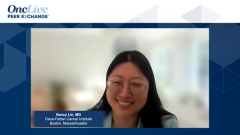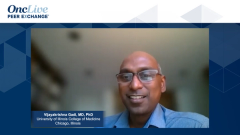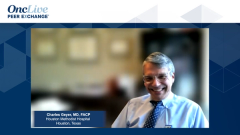
SABCS 2021: Small Molecule Clinical Trials in R/R HER2+ mBC
Rounding out their conversation on SABCS 2021, experts discuss small molecule–based treatment strategies for relapsed/refractory HER2+ metastatic breast cancer.
Episodes in this series

Vijayakrishna Gadi, MD, PhD: Nancy, there were some small molecule updates as well, maybe you can hit some of those for us.
Nancy Lin, MD: I think there is a cautionary note that we saw, which was from the I-SPY 2 trial, that was a neoadjuvant platform trial. What was reported is the tucatinib, paclitaxel, pertuzumab, preoperative arm, so patients got all 4 drugs: tucatinib, paclitaxel, pertuzumab, and trastuzumab. And on the one hand the clinical activity was very high, 15 out of 17 patients had a clinical radiographic response, that’s great. But there was grade 3 and 4 LFT [liver function test] elevation, and even after they dose reduced the tucatinib to 150 mg down from 300 mg, they still saw grade 3 LFT elevations. I think 2 points, one is that I think there is room to develop other tucatinib-based chemotherapy/trastuzumab combinations. Clearly it was an active regimen, but I wouldn’t go doing this in an off-label manner in clinical practice because I think the toxicity was really quite cautionary. To see a very high rate of grade 3 and 4 toxicity even with a 50% dose reduction, I think is really concerning to say, I am not going to be combining tucatinib with other chemotherapies indiscriminately in my clinic.
The other ADC [antibody-drug conjugate] that we didn’t touch on, which I thought would be worth touching on, is ARX788. That’s a HER2-targeted ADC, the payload is a tubulin inhibitor. What was really exciting about that presentation, speaking to Chuck’s point, is that there was activity seen, over 60% objective response rate even in patients with prior HER2 TKI [tyrosine kinase inhibitor], even in patients with prior T-DXd [trastuzumab deruxtecan], prior T-DM1 [trastuzumab emtansine], some sort of prior HER2 ADC. So, I think that’s a very interesting compound. There was ocular toxicity seen and there was ILD [interstitial lung disease] seen, so we are going to have to keep an eye on that, but there is a phase 2 trial that has been launched already, ACE-Breast-03. I think we’re going to see more of that compound going forward.
Vijayakrishna Gadi, MD, PhD: Nancy, while I still have you, I think there was a bit of an update from TBCRC049 with Rashmi Murthy, MD, et al, for leptomeningeal disease. Could you comment on that perhaps?
Nancy Lin, MD: Sure. This was a study looking specifically at HER2-positive leptomeningeal disease. The study was closed early because essentially 17 patients were enrolled, and then COVID-19 hit, and tucatinib was commercially approved and available, and the accrual basically went down to zero. But despite the small numbers, I think it was really encouraging. The median overall survival, though was only 10 months, is actually very long in comparison to what we see from all population-based studies, where the median survival tends to be less than 6 months. There were responses seen, there was a decent PFS [progression-free survival] that was seen. And I think that it adds a treatment option that’s a systemic option for patients who have leptomeningeal disease, which I think is really very much needed. What was also interesting about the study and already presented at ASCO [American Society of Clinical Oncology annual meeting] was that they were able to measure tucatinib concentrations in the CSF [cerebrospinal fluid], and the CSF-to-plasma ratio was 0.8 at steady state. They were able to also show that tucatinib, we know that it must get into the brain mets [metastases] because of the CNS activity, but there was actually very good penetration into the CSF, which I think was very important to know.
Transcript edited for clarity.








































